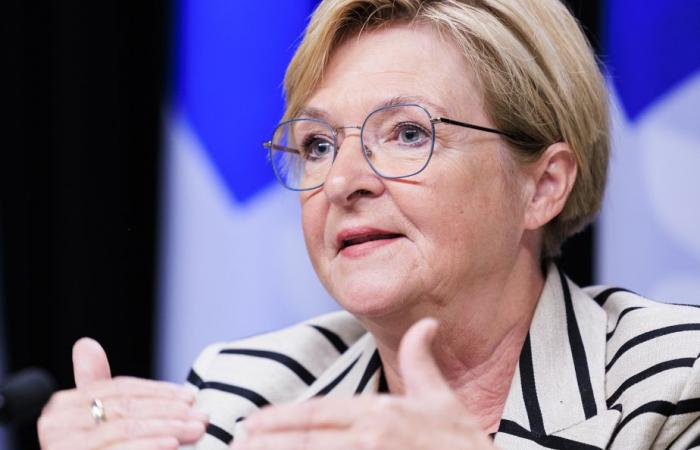(Quebec) At the very moment when Quebec is scrutinizing its spending, its promises of savings are not there. The consolidation of government purchases is not effective and the transformation of public service office spaces is long overdue.
Posted at 1:56 p.m.
This is what emerges from the latest report of the Auditor General (VG) tabled Wednesday in the National Assembly. Guylaine Leclerc notably carried out performance audits on the Government Acquisition Center (CAG) and on the vast project to transform government office spaces, announced by Quebec in 2018 to take advantage of new technologies.
“The Government Acquisition Center does not carry out several of the purchasing groups that are planned in its annual planning, the CAG therefore finds itself entering into over-the-counter contracts to meet the needs of departments and agencies. Sometimes they are even [eux] who directly obtain the goods and services they need,” said Mme Leclerc.
“This situation limits the effectiveness of the groupings and creates dissatisfaction,” adds the public accounts watchdog.
When it was created in 2020, the CAG was notably expected to “maximize resource expertise” during the acquisition and “achieve efficiency gains”.
In its report, the VG also maintains that “the number of files carried out is decreasing” and that “the numerous delays and cancellations” force the CAG to award contracts by mutual agreement “to avoid interruptions of services”, perhaps we read.
Furthermore, the CAG “does not adequately evaluate the savings generated” by grouped acquisitions and the information available does not make it possible to “adequately monitor” them and evaluate their performance. Purchasing Quebec and sustainable products “remains a challenge.”
The CAG estimates savings of 407.9 million in 2022-2023. However, “this evaluation has limits”, deplores the VG as “a non-uniform application of the methodology”. The “insufficient” information on the limits of the calculation does not allow “to know what is really measured”.
Generally speaking, “the data available to the CAG are incomplete and are not always reliable, which does not allow it to adequately plan and monitor” their activities.
The CAG brings together government purchases and is responsible for grouped acquisition contracts. In 2022-2023, the contracts awarded by the organization represented a total value of 5.8 billion.
This value increases to 4.3 billion the following year, in 2023-2024. This drop is explained by a “significant number of withdrawals and postponements of files” justified by “the capacity to carry out the CAG” and the revision of the prioritization of files.
Budgetary context
While the Legault government plans to record a historic deficit of 11 billion, it would benefit from improving the performance of the CAG and having reliable data, according to the VG.
Furthermore, even when planned, it is “frequently” that grouped purchases are not carried out within the planned time frame. Surprisingly, the goods and services for which a ministry has joined, for example, a grouped purchase “are not always available” at the end of the acquisition process.
The government has set savings targets of 408 million in 2023-2024 to then increase each year and reach 592 million in 2026-2027.
The audit covers the period from 1is September 2020 to March 31, 2024. The VG notes that its work takes into account “when relevant” the pandemic context in which the CAG was created.
In its response to the VG, the CAG also affirms that “until the fall of 2022, certain effects and consequences of the pandemic were felt, causing delays in certain files, in particular due to the turbulence of the supply chains. ‘supply “. The CAG “adheres” to the recommendations of the VG and undertakes “to make concrete improvements”.
Office spaces
The VG concludes, six years after the announcement of the government’s real estate vision in 2018, that only 7.2% of the 900,000 m2 needing to be transformed have been. Guylaine Leclerc has difficulty seeing how Quebec could achieve its target of having redeveloped 35% of this area by March 31, 2028.
“The government is slow to take advantage of the significant rent savings that will result from the reduction of its spaces, and no action plan or financing strategy aimed at achieving government objectives has been approved,” writes Mme Leclerc.
Furthermore, the Société québécoise des infrastructures (SQI), which supervises the construction site, “has no mechanism to monitor the performance of the projects as a whole”.
This transformation should make it possible to reduce rent costs by reducing administrative space, and to increase employee productivity, as promised by the government in 2018.






